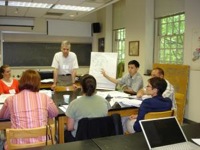Difference between revisions of "Seminar"
(Created page with 'File:lighterstill.jpgright|frame ==Origin== German, from Latin ''seminarium'' nursery or "seed plot" *[http://en.wikipedia.org/wiki...') |
m (Text replacement - "http://" to "https://") |
||
| Line 3: | Line 3: | ||
==Origin== | ==Origin== | ||
German, from [[Latin]] ''seminarium'' [[nursery]] or "[[seed]] plot" | German, from [[Latin]] ''seminarium'' [[nursery]] or "[[seed]] plot" | ||
| − | *[ | + | *[https://en.wikipedia.org/wiki/19th_century 1863] |
==Definitions== | ==Definitions== | ||
*1: a [[group]] of advanced [[students]] [[studying]] under a professor with each doing original [[research]] and all exchanging results through reports and [[discussions]] | *1: a [[group]] of advanced [[students]] [[studying]] under a professor with each doing original [[research]] and all exchanging results through reports and [[discussions]] | ||
| Line 10: | Line 10: | ||
*3: a meeting for giving and [[discussing]] [[information]] | *3: a meeting for giving and [[discussing]] [[information]] | ||
==Description== | ==Description== | ||
| − | A '''seminar''' is, generally, a form of [[academic]] instruction, either at an academic [[institution]] or offered by a commercial or professional [[organization]]. It has the [[function]] of bringing together small groups for recurring [[meetings]], [[focusing]] each time on some particular subject, in which everyone present is requested to actively [[participate]]. This is often accomplished through an ongoing [ | + | A '''seminar''' is, generally, a form of [[academic]] instruction, either at an academic [[institution]] or offered by a commercial or professional [[organization]]. It has the [[function]] of bringing together small groups for recurring [[meetings]], [[focusing]] each time on some particular subject, in which everyone present is requested to actively [[participate]]. This is often accomplished through an ongoing [https://en.wikipedia.org/wiki/Socratic_method Socratic dialogue] with a seminar [[leader]] or instructor, or through a more [[formal]] presentation of [[research]]. Normally, participants must not be beginners in the field under discussion (at US and Canadian universities, seminar classes are generally reserved for upper-class students, although at UK and Australian universities seminars are often used for all years). The [[idea]] behind the seminar system is to familiarize [[students]] more extensively with the [[methodology]] of their chosen subject and also to allow them to [[interact]] with examples of the practical [[problems]] that always occur during [[research]] work. It is essentially a place where assigned [[readings]] are discussed, [[questions]] can be raised and [[debates]] can be conducted. It is relatively [[informal]], at least compared to the [[lecture]] system of academic instruction.[https://en.wikipedia.org/wiki/Seminar] |
==See also== | ==See also== | ||
*'''''[[Lecture]]''''' | *'''''[[Lecture]]''''' | ||
[[Category: Education]] | [[Category: Education]] | ||
Latest revision as of 01:52, 13 December 2020
Origin
German, from Latin seminarium nursery or "seed plot"
Definitions
- 1: a group of advanced students studying under a professor with each doing original research and all exchanging results through reports and discussions
- 2a (1) : a course of study pursued by a seminar (2) : an advanced or graduate course often featuring informality and discussion
- b : a scheduled meeting of a seminar or a room for such meetings
- 3: a meeting for giving and discussing information
Description
A seminar is, generally, a form of academic instruction, either at an academic institution or offered by a commercial or professional organization. It has the function of bringing together small groups for recurring meetings, focusing each time on some particular subject, in which everyone present is requested to actively participate. This is often accomplished through an ongoing Socratic dialogue with a seminar leader or instructor, or through a more formal presentation of research. Normally, participants must not be beginners in the field under discussion (at US and Canadian universities, seminar classes are generally reserved for upper-class students, although at UK and Australian universities seminars are often used for all years). The idea behind the seminar system is to familiarize students more extensively with the methodology of their chosen subject and also to allow them to interact with examples of the practical problems that always occur during research work. It is essentially a place where assigned readings are discussed, questions can be raised and debates can be conducted. It is relatively informal, at least compared to the lecture system of academic instruction.[1]
